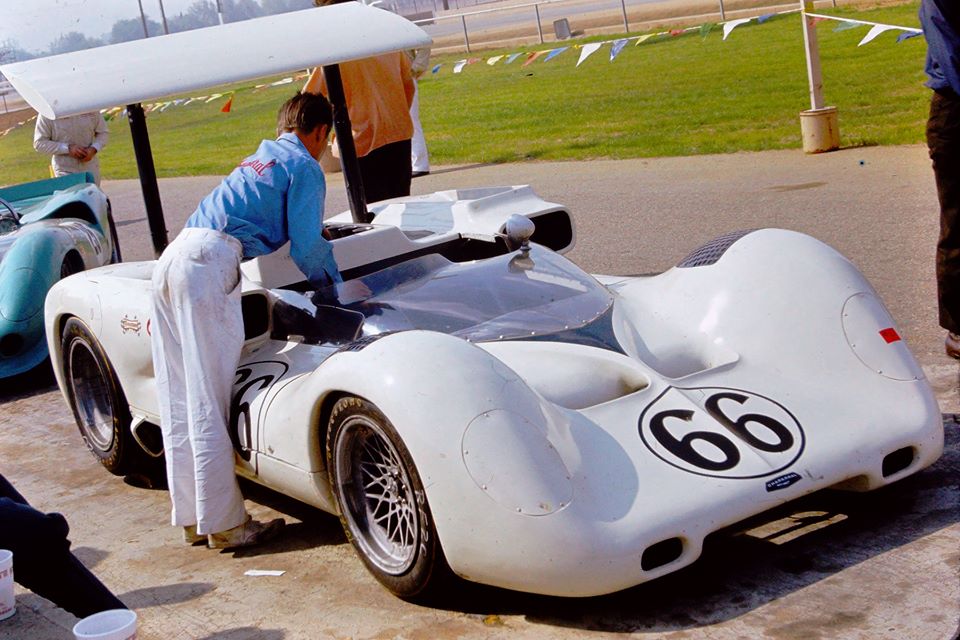Without doubt one of the most significant race cars of all time, the magnificent Chaparral 2E. This car was the brainchild of its owner Jim Hall, who had two of them made in 1966, for he and Phil Hill to drive. One was built from scratch, while the other was built from a wrecked 1965 Chaparral 2C.
The 2E used an alloy tub, originally designed by Chevrolet R&D for their 1964 Grand Sport IIb, but greatly redesigned and improved by Chaparral. Hall had close GM ties. Chevy R&D also supplied the very special small block Chevy engine with aluminium block and heads, as well as the custom made hydraulic torque converter and magnesium cased 3-speed transaxle. So the Chaparrals essentially used semi-automatic gearboxes.
Race teams had been experimenting with aerodynamics in Group 7 sports car racing for a few years, and cars were slowly sprouting front and rear wings. But Hall was really the first to actually attempt to manipulate the air movement around and inside the car to help with both increasing downforce and reducing drag.
The most notable feature of the 2E is its tall rear aerofoil. Up to this point, rear wings had been mounted directly onto the vehicles body. While this helped improved downforce, the constant increase and reduction in downforce based on the vehicles speed made it hard to find a spring rate that worked in all situations. This is because the downforce was being applied to the body, and not the tyres.
Hall had already attempted moving aerodynamics with his 2C of 1965. It featured a large rear ‘flipper’ spoiler, attached to the bodywork, which could be activated by the driver. Thanks to the Chevy R&D automatic gearbox, the Chaparral drivers didn’t have to press the clutch every time they changed gear. They still had to change gear manually by hand, but all they needed to do was ease off the throttle slightly, and select the next gear.
The 2Cs were set up for left foot braking. But in addition, there was another pedal where the clutch would normally be. This pedal activated the rear flipper wing. The wing was flattened out on the straights to lessen downforce and drag, then flipped back up again for corners to provide downforce.
The same theory was brought across to the 2E for 1966, but instead of activating the flipper, it was the tall rear aerofoil that was being moved. The difference was, whereas the 2C had a body mounted rear spoiler, the aerofoil on the 2E sat atop a pair of tall struts which connected directly to the rear wheels hubs. That meant the downforce was being applied directly to the tyres, and not the body, which did away with the requirement for increased spring rates.
In addition, the 2Es had hip-mounted radiators, which freed up space inside the nose to further manipulate air flow. Inside the nose was a pair of flaps, which spun much like a carburettor butterfly.
So when the driver was travelling along a straight, he’d press the left pedal, the rear aerofoil would flatten out, reducing downforce and drag, and at the same time, the flaps in the nose would close off the holes, which balanced the changing downforce from the rear wing. When he took his foot off the pedal to compress the brake, the rear aerofoil would flip forward, and the nose flaps would open, to greatly increase downforce through corners.
There were numerous other ground breaking features in the 2Es. Remember, in 1966, Formula 1 cars had no aerodynamics at all. It was the 2E that influenced the hub mounted aerofoils in both F1, and the Can-Am. By 1969, most front running Can-Am cars featured these before the FIA banned them due to failures in F1. However, none of these could be activated by the driver. They sat in a fixed position.
Given the impact Hall’s designs had in the area of aerodynamics, it seems crazy that Chaparral recorded only a single race victory from five years in the Can-Am series.





 Reply With Quote
Reply With Quote
